| | US layoffs surge, Microsoft plans for ‘humanist’ superintelligence, and researchers create ‘Google M͏ ͏ ͏ ͏ ͏ ͏ |
| |   ALMETYEVSK ALMETYEVSK |   GUANGZHOU GUANGZHOU |   DARWIN DARWIN |
 | Flagship |  |
| |
|
The World Today | 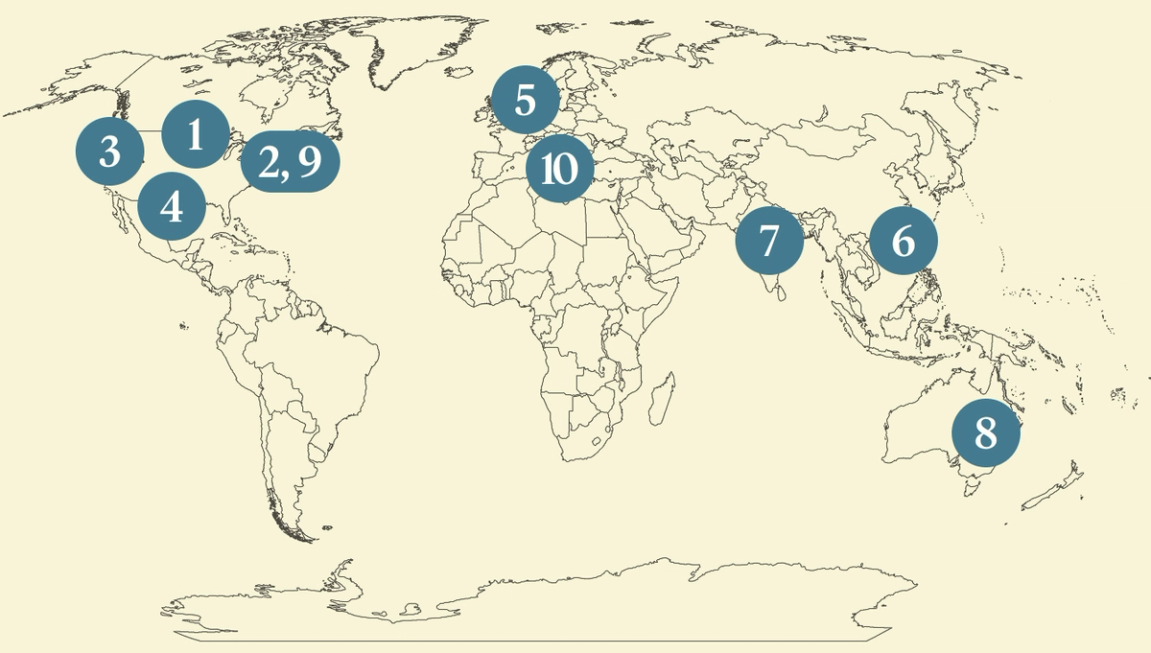 - US layoffs surge
- AI stocks face pressure
- ‘Humanist’ superintelligence
- Musk’s $1T pay approved
- Trump strikes GLP-1 deal
- US’ maritime vulnerability
- Sanctions shake India oil trade
- Free solar in Australia
- Fraudulent psychology work
- Mapping ancient Roman roads
 Homer’s rare watercolors on display, and Asian rappers lean into ‘Orientalism chic.’ |
|
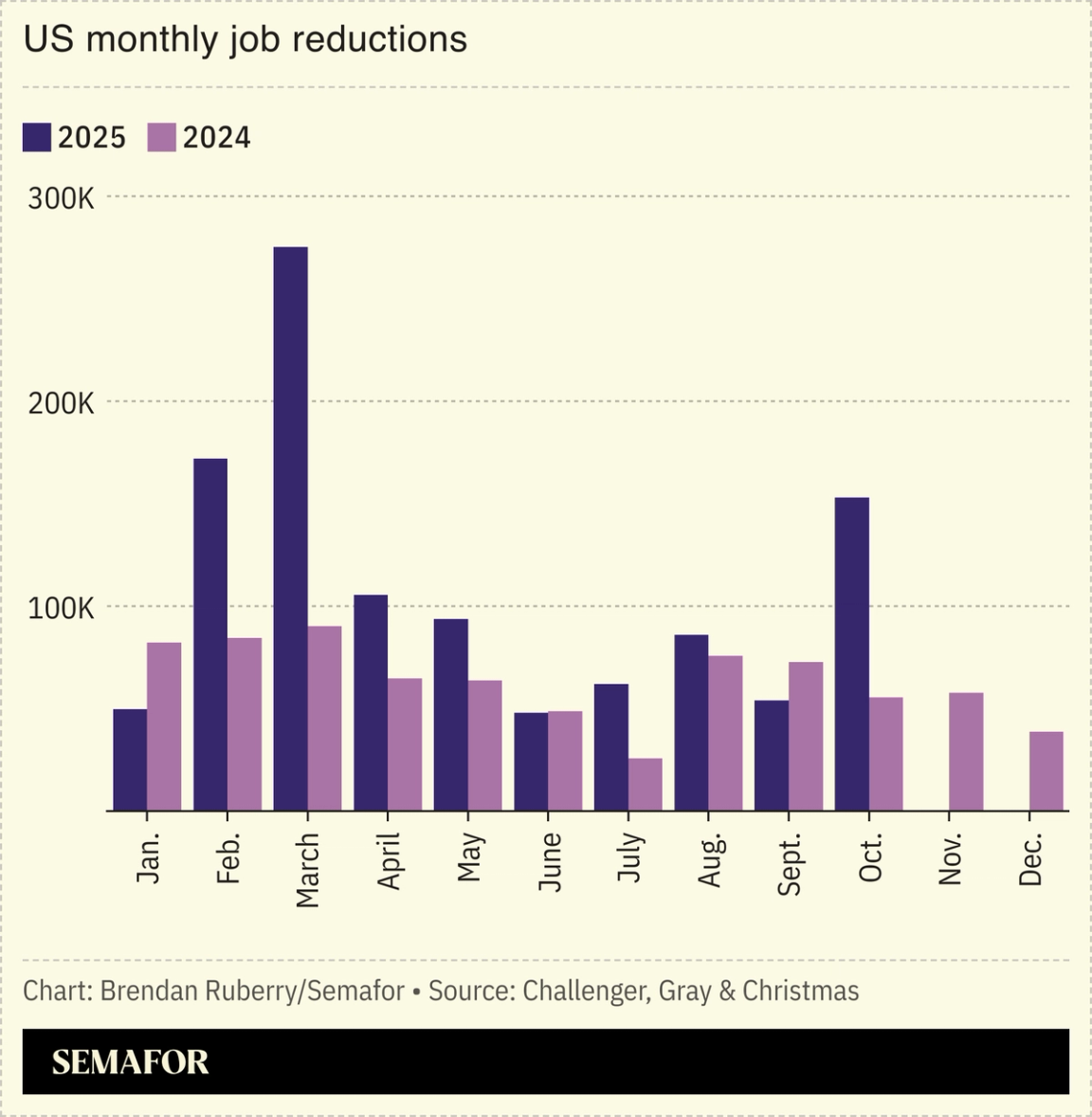 US layoffs surged in October, pushing this year’s job cuts to levels normally seen in a recession. The new figures from a consulting firm fuel concerns about a labor market slowdown in the absence of official government data; the 1.1 million layoffs this year include reductions at large firms including UPS, Amazon, and Target. While many companies cited AI as a reason for the cuts, some analysts said employers may be “AI-washing” — blaming the technology “to cover up business fumbles and old-fashioned cost cutting,” CNBC reported. Another explanation is that sectors that went on a post-pandemic hiring spree are now scaling back, The Economist wrote: The “pull-back looks less like AI upheaval than a return to normal.” |
|
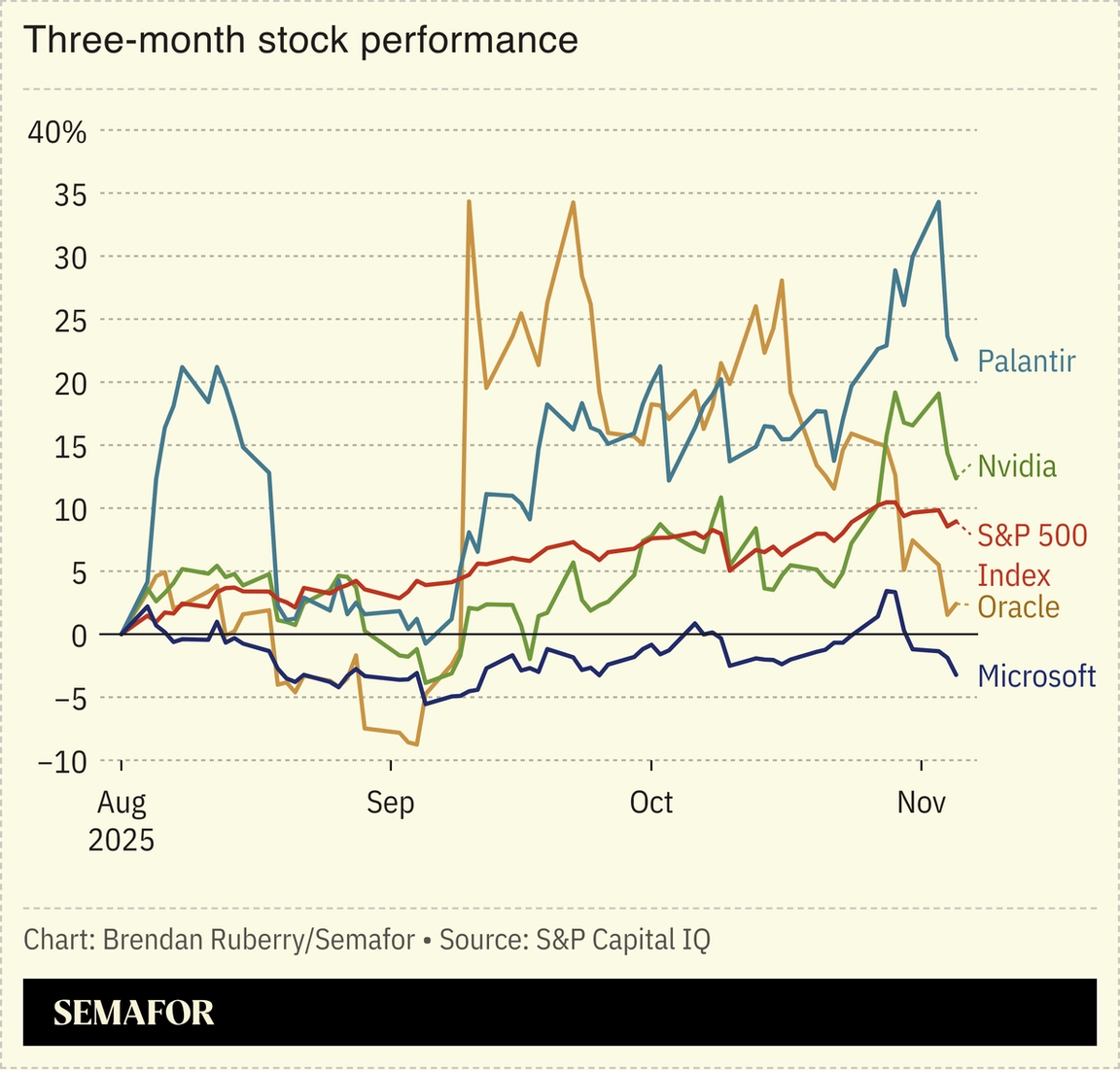 AI stocks continued falling Thursday as concerns mounted over the billions companies are pouring into data centers. The AI trade, especially AI infrastructure, has shaped the US economy this year — “Rarely, if ever, has a single technology absorbed this much money this quickly,” WIRED wrote — but investors are increasingly skeptical of the high valuations of AI-linked companies. Deutsche Bank is discussing ways to hedge its exposure to data centers, the Financial Times reported, while an OpenAI executive’s comments suggesting a possible federal “backstop” for its infrastructure commitments prompted a White House adviser to reject “AI bailouts”; OpenAI’s Sam Altman later clarified the company doesn’t want government guarantees for data centers, and “if we get it wrong, that’s on us.” |
|
‘Humanist’ approach to superintelligence |
 Denis Balibouse/Reuters Denis Balibouse/ReutersMicrosoft is joining the race for superintelligence, but the company plans to ensure humans stay in charge of the technology at the expense of maximum capability. Microsoft’s push comes as OpenAI and Meta also rush to develop a new form of advanced AI, even as prominent figures have called for a ban on such efforts. Microsoft AI CEO Mustafa Suleyman told Semafor’s Reed Albergotti that the company is focusing on “humanist superintelligence” instead of accelerating at all costs: It’s “a very tough tradeoff,” but the alternative is “a crazy suicide mission,” Suleyman said. AI critics will be skeptical of Microsoft’s ability to keep that promise, Albergotti wrote, but Microsoft’s customers “would be happy with average intelligence with superhuman reliability.” |
|
Tesla shareholders approve Musk pay |
 Daniel Cole/Reuters Daniel Cole/ReutersTesla shareholders approved CEO Elon Musk’s $1 trillion pay package Thursday. The proposal, which requires Musk to grow the EV giant’s valuation and hit certain production goals like vehicle deliveries, overwhelmingly passed despite an unusual amount of resistance, The Washington Post reported. Critics said the milestones are too weak, and that Musk is distracted by side ventures. Musk argued, however, that he “drove [Tesla] to where it is and without me it’s going to fail,” one expert summarized. The pay deal is set to shepherd in a new era of executive compensation, and comes at a pivotal time for Tesla: Profits have fallen amid its challenges in Europe and China. |
|
Trump strikes GLP-1 price deal |
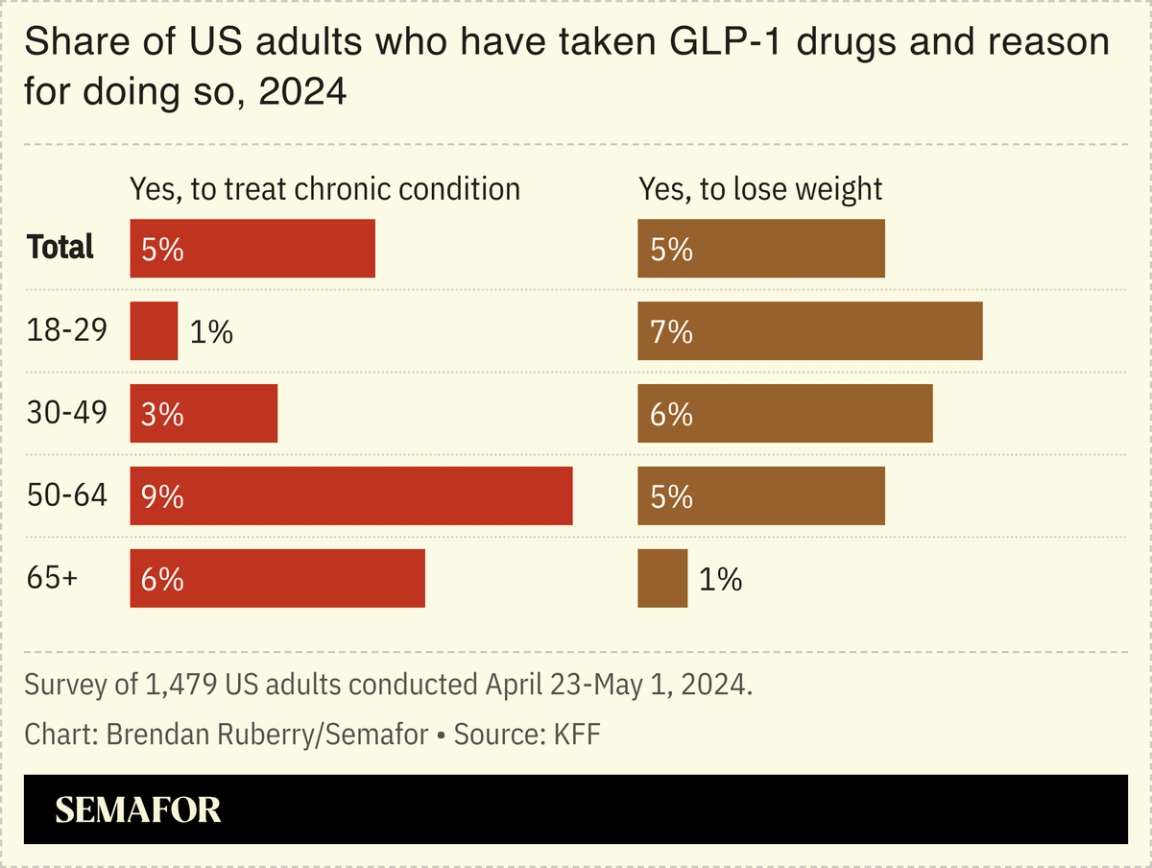 US President Donald Trump on Thursday announced deals to lower the cost of weight loss drugs Wegovy and Zepbound, a move that could vastly expand access to the blockbuster medications. The agreements with pharma giants Eli Lilly and Novo Nordisk could bring the price of the GLP-1 injectables from roughly $1,350 to $149 per month. The US health secretary estimated that because of the lower costs, Americans could lose a collective 125 million pounds by next November. The benefits of GLP-1 drugs go beyond weight loss: Experts say they reduce spending on fast food and processed snacks, and studies have shown they can improve heart health. |
|
US lags China on shipping, logistics |
 Stringer/Reuters Stringer/ReutersChina’s dominance in maritime logistics is a threat to the US’ economic and national security, analysts argued. China operates the world’s largest cargo fleets and the biggest navy; it built as many as 1,700 oceangoing vessels last year; the US built five. Once the world’s shipbuilding powerhouse, the US now “depends on Beijing’s fleet to deliver everything from food and medicines to electronics,” a trade expert noted. This “unglamorous” matter of logistics is the US’ “weakest link” in deterring China in any conflict, experts argued in Breaking Defense. US President Donald Trump said he wants “more ships faster,” but it will take Washington “years of skillful statecraft… to restore some measure of parity with China,” Semafor’s Andy Browne wrote. |
|
Sanctions shake up Indian oil sector |
 Alexander Manzyuk/Reuters Alexander Manzyuk/ReutersNew US sanctions on Russian oil are shaking up India’s energy trade. Moscow’s fuel exports to India have plunged since Washington announced restrictions on two Russian oil giants last month, and discounts on Russian crude have reached their steepest point in a year in Asia. Following the sanctions, large Indian refiner Reliance Industries snapped up millions of barrels from the Middle East and the US and, in a rare move, is reportedly trying to resell Mideast crude. The upheaval reflects how the Ukraine war and subsequent Western sanctions created an “energy nexus” between Moscow, Beijing, and New Delhi, transforming the “energy trade into a platform for political alignment,” a scholar wrote in East Asia Forum. |
|
 The Secretary of Health for Maryland, Meena Seshamani, M.D., Ph.D., will join the stage at The Future of Health Forum in Washington, DC on November 18, 2025. As discussions continue around federal programs such as the ACA subsidies extended under the 2021 Inflation Reduction Act, Americans are confronting rising healthcare costs, shrinking community services, and persistent workforce shortages. Affordability, access, and quality of care remain more urgent concerns than ever. To explore the factors shaping this moment — and potential solutions — Semafor will convene leading experts for a forum on the future of US health care. Nov. 18 | Washington, DC | RSVP → |
|
|
Australia offers free solar to millions |
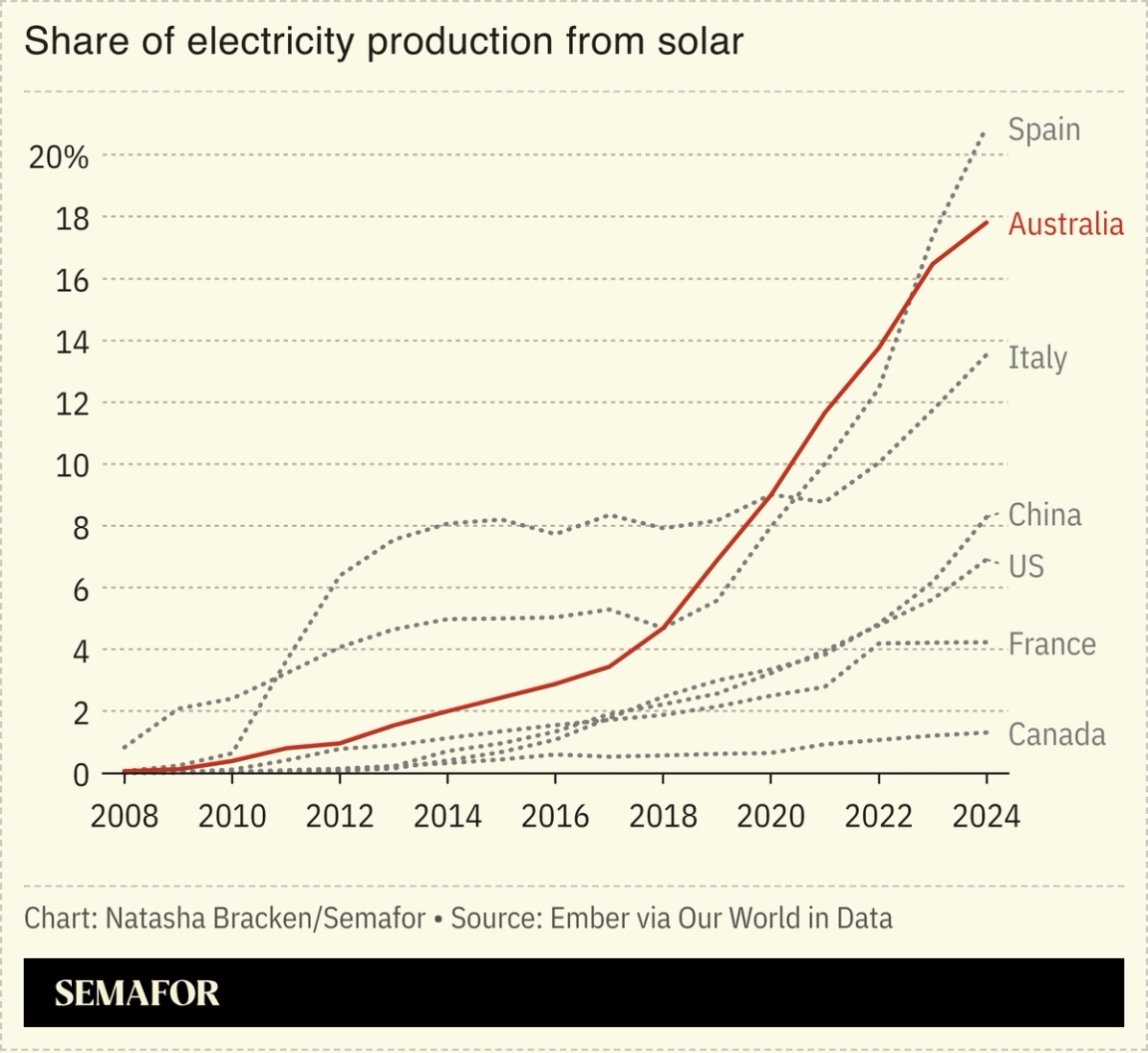 Australians will get three hours of free solar electricity a day, even if they don’t have solar panels. The “Solar Sharer” program, set to launch in parts of the country before expanding elsewhere, will offer free energy during high-supply periods in the middle of the day, encouraging residents to make discretionary energy uses — such as charging cars or using tumble dryers — during those times. The cost of solar capacity fell by about 90% in the last decade, but it remains intermittent, meaning supply must be smoothed out with batteries or alternative sources such as fossil fuels or nuclear. Canberra’s move addresses the other end of the problem, attempting to align demand with periods of greatest supply and reducing the need for smoothing. |
|
Classic psych work fraudulent |
A classic psychology work, the basis for the idea of “cognitive dissonance,” has been shown to be fraudulent. When Prophecy Fails by Leon Festinger described a cult that purportedly believed it would be saved by aliens on Dec. 20, 1954. Festinger claimed that after that date, the group — instead of accepting they were wrong — doubled down, and started to proselytize more strongly. Festinger’s arguments essentially created the concept of cognitive dissonance. But a new paper shows that the group dissolved soon after the failed prophecy, and that Festinger falsified the subsequent events. It follows the Stanford Prison Experiment, the “On Being Sane in Insane Places” study, and several other foundational works of psychology that have been shown to be fraudulent. |
|
‘Google Maps for Roman roads’ |
|
|